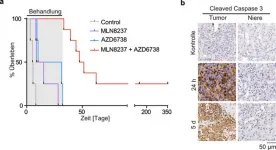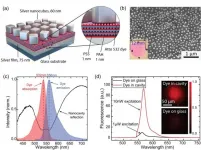(Press-News.org) A commercially available genomic test may help oncologists better determine which patients with recurrent prostate cancer may benefit from hormone therapy, according to new research from the Johns Hopkins Kimmel Cancer Center and 15 other medical centers.
Researchers studied prostate cancer samples from 352 participants in the NRG/RTOG 9601 clinical trial, which compared radiation therapy alone with radiation therapy combined with hormone therapy. The investigators found that the Decipher test, which measures the activity of 22 genes among seven known cancer pathways, independently estimated the participants' risk of metastasis, death from prostate cancer and overall survival. Researchers say it also guided treatment recommendations for recurrence of prostate cancer after surgery, helping identify patients most likely to benefit from hormone therapy.
Results were published online Feb. 11 in the journal JAMA Oncology.
"The findings may be practice-changing, and will give oncologists additional information to help guide decisions on whether to offer patients hormone therapy," says senior study author Phuoc Tran, M.D., Ph.D., professor of radiation oncology and molecular radiation sciences and co-director of the Cancer Invasion and Metastasis Program at the Johns Hopkins Kimmel Cancer Center.
For the study, Tran and colleagues studied prostate cancer samples from 352 men whose prostate cancer recurred after surgery and who participated in the NRG/RTOG 9601 clinical trial of radiation therapy between March 1998 and March 2003. The participants were randomized to receive radiation with hormone therapy (150 milligrams of bicalutamide daily for two years) or radiation therapy without hormone therapy. The researchers ran genetic information called ribonucleic acid (RNA) from the tumor tissue through the Decipher test, which evaluates the activity of 22 genes to predict how aggressive the cancer is and its chances of metastasis.
The test uses "genomic classifier scores" determined from the genomic characteristics of the tumor to stratify patients into three groups. Lower scores correlate with a more favorable prognosis. Of the participants, 148 patients (42%) had low genomic classifier scores, below .45; 132 (38%) had intermediate genomic classifier scores, between .45 and .60; and 72 (20%) had high genomic classifier scores, above .60. These genomic classifiers helped predict the risk of distant metastases, prostate cancer-specific death and overall survival, even after adjusting for participants' age, race/ethnicity, Gleason score, T stage of T1 to T4 to classify the extent of tumor spread, margin status, prostate-specific antigen level and whether they were receiving hormone therapy.
Specifically, patients with intermediate and high genomic classifier scores had an 88% increased risk of distant metastases versus those with low genomic classifier scores. The test also demonstrated that patients with lower genomic classifier scores had a 2.4% improvement in overall survival 12 years after treatment with radiation and hormone therapy, compared with an 8.9% improvement among those with higher genomic classifier scores. Additionally, patients receiving radiation therapy soon after recurrence benefited more from hormone therapy. Those with higher genomic classifier scores derived an 11.2% improvement in 12-year occurrence of distant metastasis and a 4.6% improvement in overall survival from taking hormone therapy.
"Patients with lower scores do better overall, but they do not benefit as much from adding on hormone therapy because they are low risk. Patients with higher scores have worse disease and, therefore, benefit the most from adding the hormone therapy," explains Tran.
"The way that we treat many patients in the clinic now is based on pathological and clinical factors, such as age, stage, grade and imaging," Tran says. "Those have been very helpful, but you can only go so far with these rough markers. Hormone therapy unfortunately has a whole host of side effects, such as lack of libido, lack of erections and fatigue, and over time can increase the risk of diabetes, heart attack or stroke, so you only want to prescribe it if it is clearly beneficial. Our study demonstrated that Decipher is prognostic in its ability to determine cancer metastasis and also prostate cancer-specific survival and overall survival. It also was able to determine the benefit of patients receiving hormones or no hormones." Tran says the information the test provides guides precision medicine efforts to help physicians direct hormone therapies to those most likely to benefit from them.
INFORMATION:
The work was supported by grant U10CA180868 from NRG Oncology Operations, grant U10CA180822 from NRG Oncology SDMC, grant UG1CA189867 from NCORP, grant U24CA196067 from NRG Specimen Bank, and grant R01 CA240582 from the National Cancer Institute and Decipher Biosciences.
Other contributors to the work were from the University of California San Francisco Medical Center; Decipher Biosciences, San Diego; the University of Michigan; Cedars-Sinai Medical Center, Los Angeles; Brigham and Women's Hospital, Boston; the University of Miami Miller School of Medicine; Massachusetts General Hospital, Boston; Thomas Jefferson University Hospital, Philadelphia; Emmes Canada, Vancouver; the NRG Oncology Statistics and Data Management Center, Philadelphia; the University of Chicago; Dana-Farber/Harvard Cancer Center, Boston; University College, London; Centre Hospitalier de l'Université de Montréal; Juravinski Cancer Centre at Hamilton Health Sciences, Canada; the Medical College of Wisconsin; Mayo Clinic; and WellSpan Health-York Cancer Center.
Tran reported receiving grants from Astellas Pharm, Bayer Healthcare and RefleXion, and personal fees for consulting from RefleXion and Ad Board from Noxopharm outside the submitted work. Tran also reported having a patent licensed to Natsar Pharm. These relationships are being managed by The Johns Hopkins University in accordance with its conflict of interest policies.
The PCR test is the most accurate tool to identify SARS-CoV-2. However, valid results are often available only after days. Moreover, the laboratory must be well equipped, have trained personnel and sufficient financial resources. All of this is usually a problem in Africa. A portable suitcase could help. In cooperation with several African universities, scientists at Leipzig University have found that this mini-laboratory provides test results that are almost as good as a PCR test - and almost in real time. The researchers have now published their findings in the journal "Analytical Chemistry".
The compact case could provide rapid coronavirus test results in regions of ...
Neuroblastomas are malignant solid tumours that occur mainly in early childhood. They arise from degenerated immature cells of the sympathetic nervous system.
One prognostic marker to assess the malignancy of the tumour is the MYCN oncogene. High-risk neuroblastoma patients often have amplification of MYCN, i.e. very high levels of this protein, which drives uncontrolled tumour growth. Conversely, inhibiting MYCN or its function could be a promising therapeutic opportunity.
An important step towards this direction was taken by an international research project led by scientists ...
A urine test based on University of Michigan Rogel Cancer Center research could have avoided one third of unnecessary prostate cancer biopsies while failing to detect only a small number of cancers, according to a validation study that included more than 1,500 patients. The findings appear in the March issue of the Journal of Urology.
The MyProstateScore test, which is being commercialized by LynxDX, a U-M startup company, measures levels of cancer-specific genes in a patient's urine. It is based on U-M research that discovered that half of all prostate tumors harbor a certain ...
Among firearm-owning individuals who died by suicide, handgun ownership was associated with greater odds of having died by self-inflicted gunshot wound rather than by another method, according to a Rutgers researcher.
The study, published in the Archives of Suicide Research, surveyed surviving loved ones of 121 handgun and shotgun owners who died by suicide -- 93 of whom died with a firearm and 28 who died through other means -- and asked about the numbers and types of firearms the individuals had and the circumstances of their deaths.
The researchers found that 77 percent of those who died using a firearm, as well as 61 percent of those who died using another method, owned a handgun. They also found that 88.8 percent of individuals who only owned handguns used a firearm in their ...
Superconductors -- materials that conduct electricity without resistance -- are remarkable. They provide a macroscopic glimpse into quantum phenomena, which are usually observable only at the atomic level. Beyond their physical peculiarity, superconductors are also useful. They're found in medical imaging, quantum computers, and cameras used with telescopes.
But superconducting devices can be finicky. Often, they're expensive to manufacture and prone to err from environmental noise. That could change, thanks to research from Karl Berggren's group in the Department of Electrical Engineering and Computer Science.
The researchers are developing a superconducting nanowire, which could enable more efficient superconducting electronics. The ...
It is no secret that U.S. politics is polarized. An experiment conducted by MIT researchers now shows just how deeply political partisanship directly influences people's behavior within online social networks.
Deploying Twitter bots to help examine the online behavior of real people, the researchers found that the likelihood that individuals will follow other accounts on Twitter triples when there appears to be a common partisan bond involved.
"When partisanship is matched, people are three times more likely to follow other accounts back," says MIT professor David Rand, co-author of a new paper detailing the study's results. "That's a really big effect, and clear evidence of how important a role partisanship plays."
The finding helps reveal ...
A new largescale genetic analysis has found biological mechanisms that contribute to making people more susceptible to muscle weakness in later life, finding that diseases such as osteoarthritis and diabetes may play a large role in susceptibility.
As we get older we lose muscle strength, and in some people this severe weakness impacts their ability to live everyday lives, a condition called sarcopenia. Around 10 per cent of people over 50 experience sarcopenia. Many causes thought to impact likelihood of developing this weakness, which is linked to higher death rates.
In a genetic analysis of over 250,000 people aged over 60 from UK Biobank and 21 other cohorts, an international team led by researchers at the University of Exeter ...
WASHINGTON -- Researchers have created a new plasmonic metasurface that achieves record high light efficiency over the entire centimeter-scale metasurface. The advance makes the new nanostructured thin film practical for use in a variety of applications from light-based communication to fluorescence-based biosensing.
"The major obstacles for using plasmonic structures for practical applications is that they are either too inefficient or their nanoscale properties aren't easily scalable to larger sizes," said research team leader Maiken H. Mikkelsen from Duke University. "We designed ...
DURHAM, N.C. - Visible and infrared light can carry more data than radio waves, but has always been confined to a hard-wired, fiber-optic cable. Working with Facebook's Connectivity Lab, a Duke research team has now made a major advance toward the dream of ditching the fiber in fiber optics.
While working to create a free-space optical communication system for high-speed wireless internet, the researchers also show that speed and efficiency properties previously demonstrated on tiny, single-unit plasmonic antennas can also be achieved on larger, centimeter-scale devices.
The research appears online Feb. 11 in the journal Optica.
In 2016, researchers from Internet.org's Connectivity Lab--a subsidiary of Facebook--outlined a new type of light detector that could ...
A total of 1.1 million bitcoin were stolen in the 2013-2017 period. Given the current price for Bitcoin exceeding $40,000, the corresponding monetary equivalent of losses is more than $44 billion highlighting the societal impact of this criminal activity. The question arises how does the uncertainty in the Bitcoin market - measured by its volatility - respond to such cyberattacks.
A recently published research article from Dr. Klaus Grobys (University of Vaasa, Finland) in the well-known journal Quantitative Finance addresses this question.
In his study, he examined 29 hacking incidents that occurred in the Bitcoin market in the 2013-2017 period. A surprising result of this study is that Bitcoin volatility does not respond to hackings with a subsequent ...





